Analyzing Tourism's Impact on Society: Sociological Theories
VerifiedAdded on 2023/06/04
|9
|2751
|97
Essay
AI Summary
This essay examines the multifaceted relationship between tourism and society, focusing on the impacts of tourism through various sociological theories, principles, and models. It highlights the social benefits of tourism, such as strengthening communities and preserving local culture, while also addressing issues like gender inequality and the challenges faced by the tourism industry. The essay uses the tourism life cycle model to observe the evolution of tourism destinations and employs PESTLE analysis to assess the political, economic, social, technological, environmental, and legal factors influencing the industry. It also discusses the positive and negative impacts of tourism on the UK, including job creation and economic growth, as well as inequality and pay gaps. The essay concludes by emphasizing the importance of ethical and sustainable practices for maintaining the growth of the tourism industry and addressing the changing preferences of customers while complying with legal aspects.
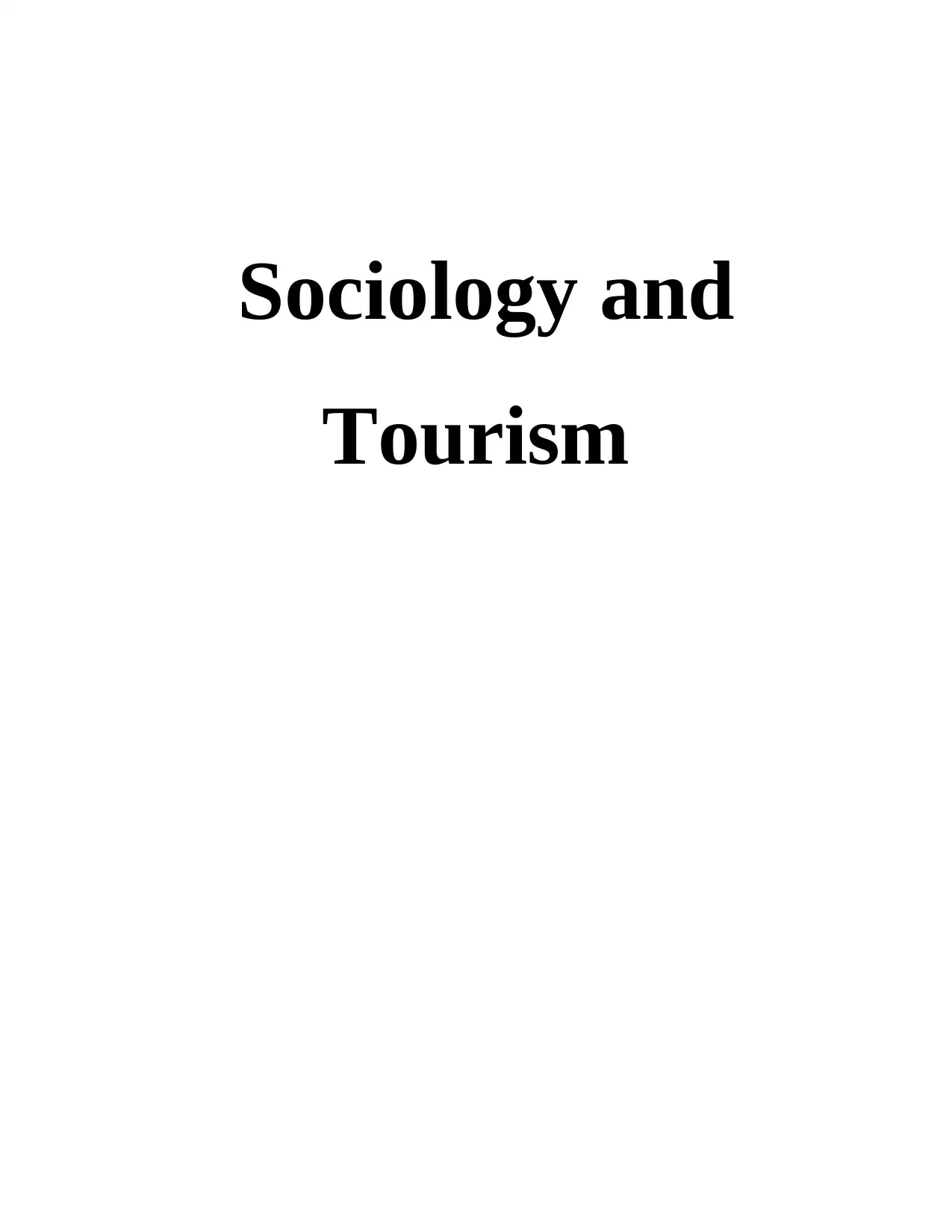
Sociology and
Tourism
Tourism
Paraphrase This Document
Need a fresh take? Get an instant paraphrase of this document with our AI Paraphraser
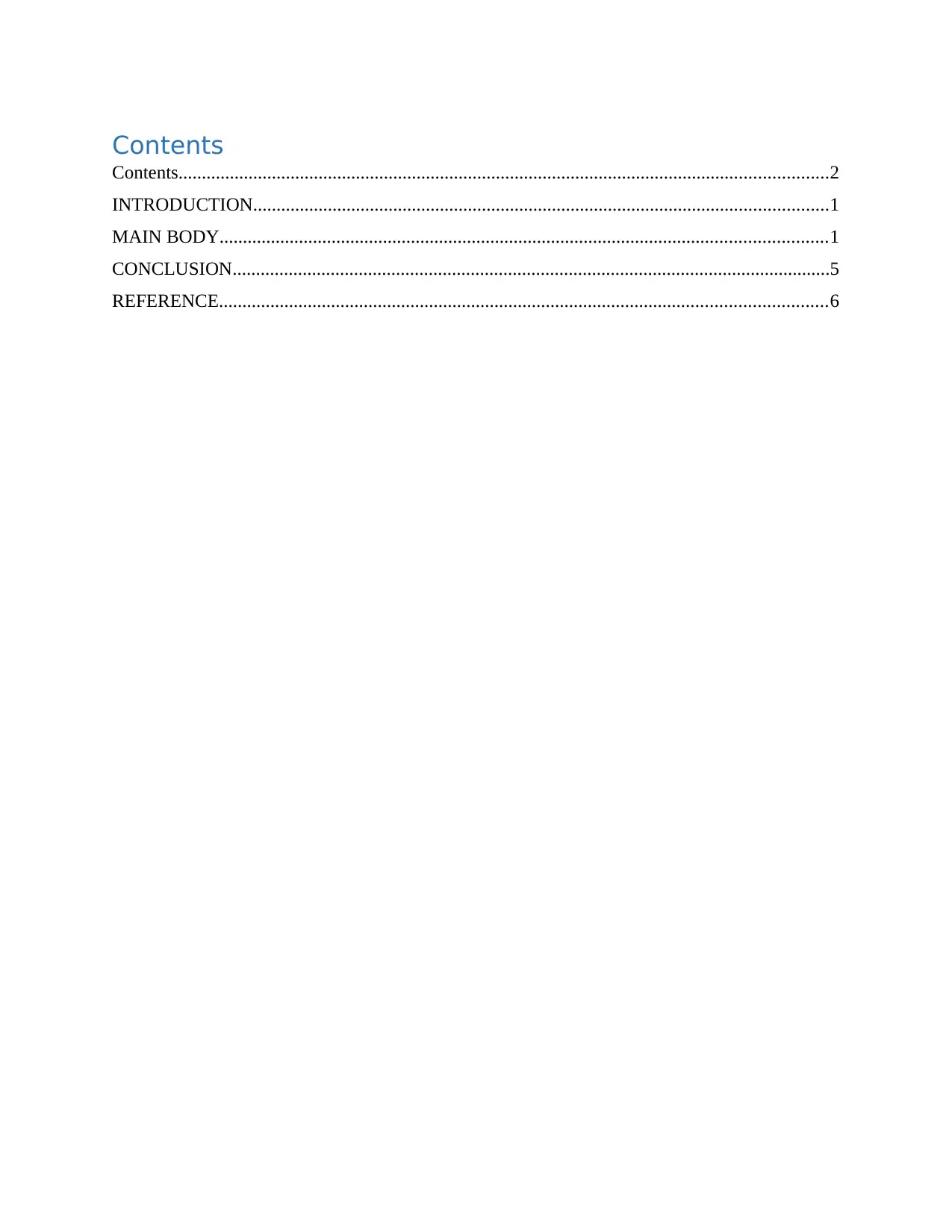
Contents
Contents...........................................................................................................................................2
INTRODUCTION...........................................................................................................................1
MAIN BODY..................................................................................................................................1
CONCLUSION................................................................................................................................5
REFERENCE..................................................................................................................................6
Contents...........................................................................................................................................2
INTRODUCTION...........................................................................................................................1
MAIN BODY..................................................................................................................................1
CONCLUSION................................................................................................................................5
REFERENCE..................................................................................................................................6
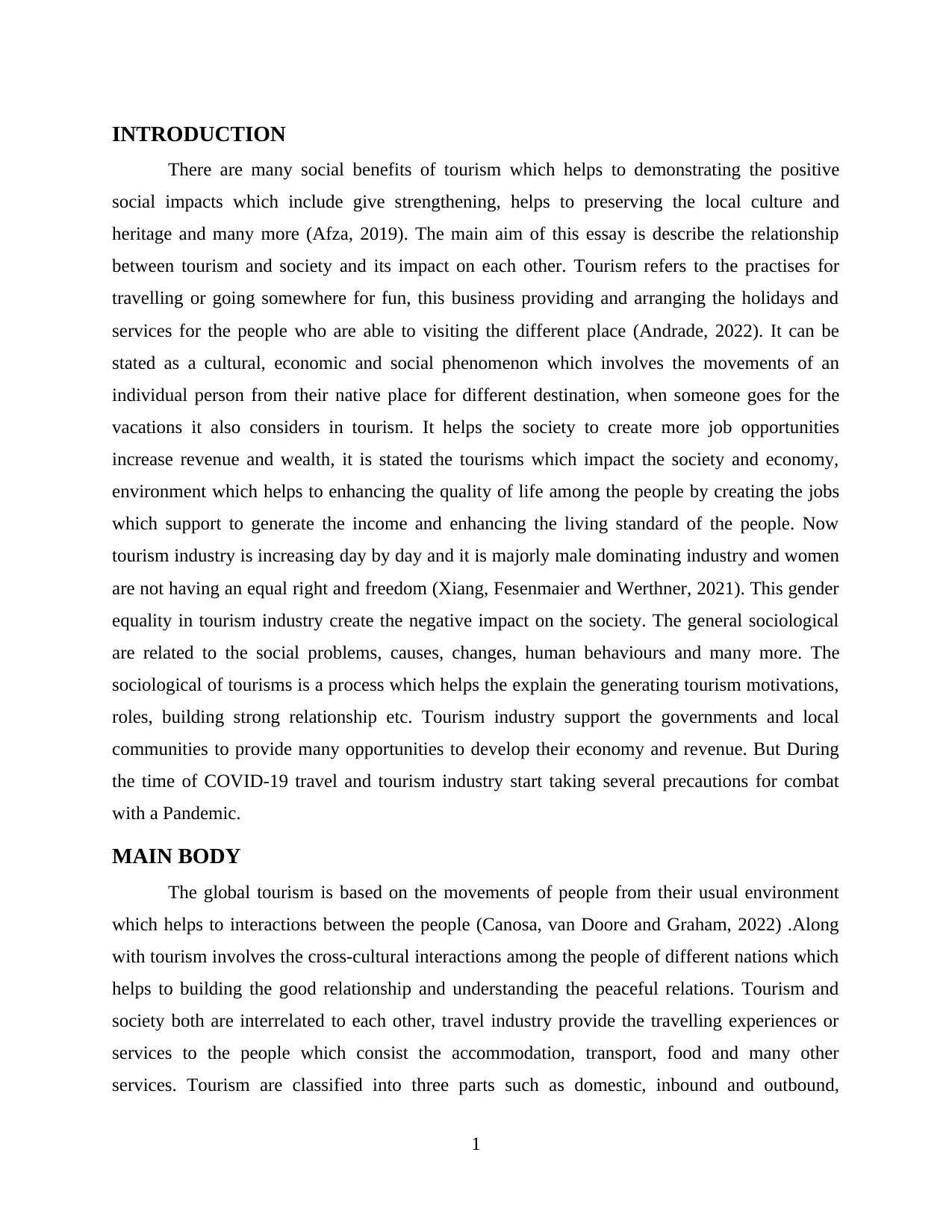
INTRODUCTION
There are many social benefits of tourism which helps to demonstrating the positive
social impacts which include give strengthening, helps to preserving the local culture and
heritage and many more (Afza, 2019). The main aim of this essay is describe the relationship
between tourism and society and its impact on each other. Tourism refers to the practises for
travelling or going somewhere for fun, this business providing and arranging the holidays and
services for the people who are able to visiting the different place (Andrade, 2022). It can be
stated as a cultural, economic and social phenomenon which involves the movements of an
individual person from their native place for different destination, when someone goes for the
vacations it also considers in tourism. It helps the society to create more job opportunities
increase revenue and wealth, it is stated the tourisms which impact the society and economy,
environment which helps to enhancing the quality of life among the people by creating the jobs
which support to generate the income and enhancing the living standard of the people. Now
tourism industry is increasing day by day and it is majorly male dominating industry and women
are not having an equal right and freedom (Xiang, Fesenmaier and Werthner, 2021). This gender
equality in tourism industry create the negative impact on the society. The general sociological
are related to the social problems, causes, changes, human behaviours and many more. The
sociological of tourisms is a process which helps the explain the generating tourism motivations,
roles, building strong relationship etc. Tourism industry support the governments and local
communities to provide many opportunities to develop their economy and revenue. But During
the time of COVID-19 travel and tourism industry start taking several precautions for combat
with a Pandemic.
MAIN BODY
The global tourism is based on the movements of people from their usual environment
which helps to interactions between the people (Canosa, van Doore and Graham, 2022) .Along
with tourism involves the cross-cultural interactions among the people of different nations which
helps to building the good relationship and understanding the peaceful relations. Tourism and
society both are interrelated to each other, travel industry provide the travelling experiences or
services to the people which consist the accommodation, transport, food and many other
services. Tourism are classified into three parts such as domestic, inbound and outbound,
1
There are many social benefits of tourism which helps to demonstrating the positive
social impacts which include give strengthening, helps to preserving the local culture and
heritage and many more (Afza, 2019). The main aim of this essay is describe the relationship
between tourism and society and its impact on each other. Tourism refers to the practises for
travelling or going somewhere for fun, this business providing and arranging the holidays and
services for the people who are able to visiting the different place (Andrade, 2022). It can be
stated as a cultural, economic and social phenomenon which involves the movements of an
individual person from their native place for different destination, when someone goes for the
vacations it also considers in tourism. It helps the society to create more job opportunities
increase revenue and wealth, it is stated the tourisms which impact the society and economy,
environment which helps to enhancing the quality of life among the people by creating the jobs
which support to generate the income and enhancing the living standard of the people. Now
tourism industry is increasing day by day and it is majorly male dominating industry and women
are not having an equal right and freedom (Xiang, Fesenmaier and Werthner, 2021). This gender
equality in tourism industry create the negative impact on the society. The general sociological
are related to the social problems, causes, changes, human behaviours and many more. The
sociological of tourisms is a process which helps the explain the generating tourism motivations,
roles, building strong relationship etc. Tourism industry support the governments and local
communities to provide many opportunities to develop their economy and revenue. But During
the time of COVID-19 travel and tourism industry start taking several precautions for combat
with a Pandemic.
MAIN BODY
The global tourism is based on the movements of people from their usual environment
which helps to interactions between the people (Canosa, van Doore and Graham, 2022) .Along
with tourism involves the cross-cultural interactions among the people of different nations which
helps to building the good relationship and understanding the peaceful relations. Tourism and
society both are interrelated to each other, travel industry provide the travelling experiences or
services to the people which consist the accommodation, transport, food and many other
services. Tourism are classified into three parts such as domestic, inbound and outbound,
1
⊘ This is a preview!⊘
Do you want full access?
Subscribe today to unlock all pages.

Trusted by 1+ million students worldwide
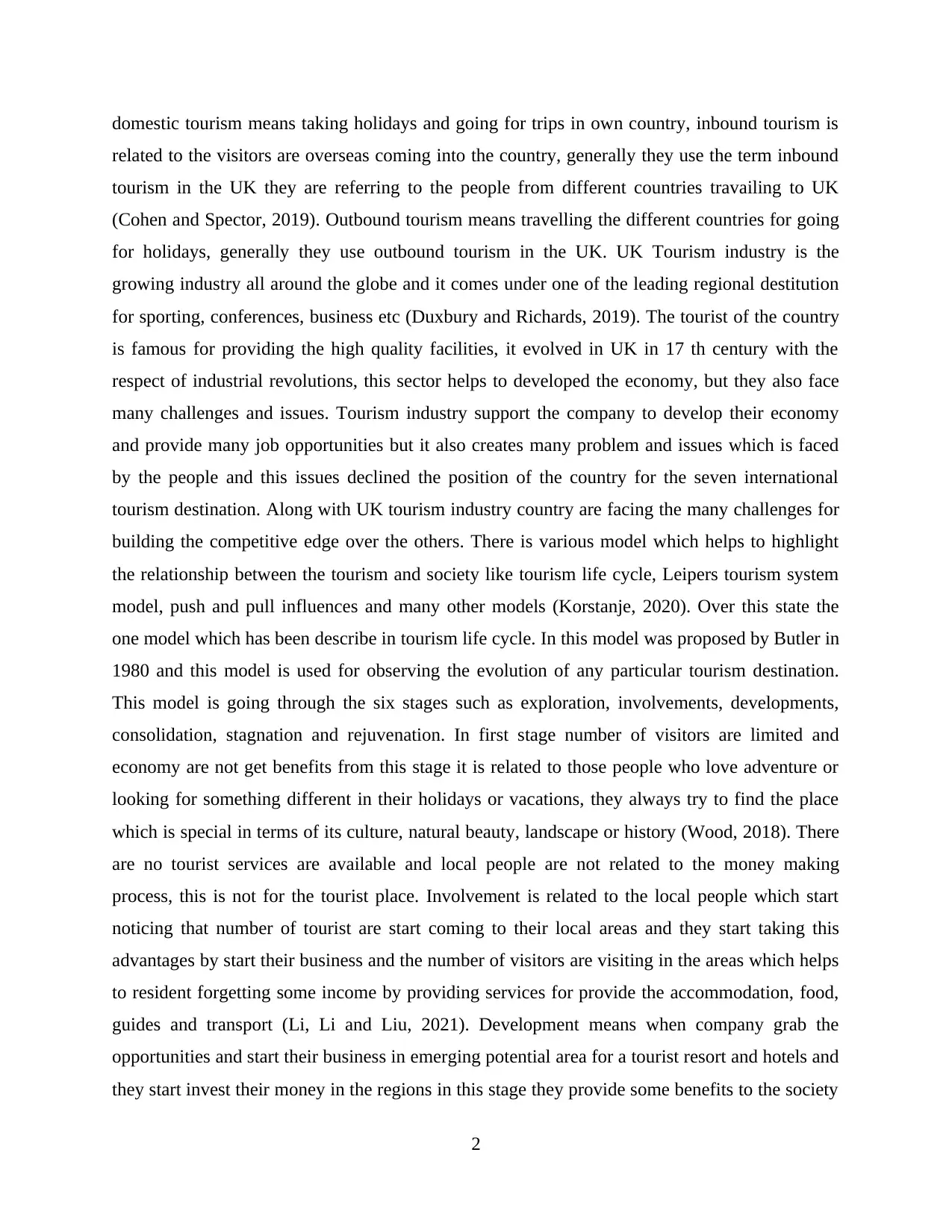
domestic tourism means taking holidays and going for trips in own country, inbound tourism is
related to the visitors are overseas coming into the country, generally they use the term inbound
tourism in the UK they are referring to the people from different countries travailing to UK
(Cohen and Spector, 2019). Outbound tourism means travelling the different countries for going
for holidays, generally they use outbound tourism in the UK. UK Tourism industry is the
growing industry all around the globe and it comes under one of the leading regional destitution
for sporting, conferences, business etc (Duxbury and Richards, 2019). The tourist of the country
is famous for providing the high quality facilities, it evolved in UK in 17 th century with the
respect of industrial revolutions, this sector helps to developed the economy, but they also face
many challenges and issues. Tourism industry support the company to develop their economy
and provide many job opportunities but it also creates many problem and issues which is faced
by the people and this issues declined the position of the country for the seven international
tourism destination. Along with UK tourism industry country are facing the many challenges for
building the competitive edge over the others. There is various model which helps to highlight
the relationship between the tourism and society like tourism life cycle, Leipers tourism system
model, push and pull influences and many other models (Korstanje, 2020). Over this state the
one model which has been describe in tourism life cycle. In this model was proposed by Butler in
1980 and this model is used for observing the evolution of any particular tourism destination.
This model is going through the six stages such as exploration, involvements, developments,
consolidation, stagnation and rejuvenation. In first stage number of visitors are limited and
economy are not get benefits from this stage it is related to those people who love adventure or
looking for something different in their holidays or vacations, they always try to find the place
which is special in terms of its culture, natural beauty, landscape or history (Wood, 2018). There
are no tourist services are available and local people are not related to the money making
process, this is not for the tourist place. Involvement is related to the local people which start
noticing that number of tourist are start coming to their local areas and they start taking this
advantages by start their business and the number of visitors are visiting in the areas which helps
to resident forgetting some income by providing services for provide the accommodation, food,
guides and transport (Li, Li and Liu, 2021). Development means when company grab the
opportunities and start their business in emerging potential area for a tourist resort and hotels and
they start invest their money in the regions in this stage they provide some benefits to the society
2
related to the visitors are overseas coming into the country, generally they use the term inbound
tourism in the UK they are referring to the people from different countries travailing to UK
(Cohen and Spector, 2019). Outbound tourism means travelling the different countries for going
for holidays, generally they use outbound tourism in the UK. UK Tourism industry is the
growing industry all around the globe and it comes under one of the leading regional destitution
for sporting, conferences, business etc (Duxbury and Richards, 2019). The tourist of the country
is famous for providing the high quality facilities, it evolved in UK in 17 th century with the
respect of industrial revolutions, this sector helps to developed the economy, but they also face
many challenges and issues. Tourism industry support the company to develop their economy
and provide many job opportunities but it also creates many problem and issues which is faced
by the people and this issues declined the position of the country for the seven international
tourism destination. Along with UK tourism industry country are facing the many challenges for
building the competitive edge over the others. There is various model which helps to highlight
the relationship between the tourism and society like tourism life cycle, Leipers tourism system
model, push and pull influences and many other models (Korstanje, 2020). Over this state the
one model which has been describe in tourism life cycle. In this model was proposed by Butler in
1980 and this model is used for observing the evolution of any particular tourism destination.
This model is going through the six stages such as exploration, involvements, developments,
consolidation, stagnation and rejuvenation. In first stage number of visitors are limited and
economy are not get benefits from this stage it is related to those people who love adventure or
looking for something different in their holidays or vacations, they always try to find the place
which is special in terms of its culture, natural beauty, landscape or history (Wood, 2018). There
are no tourist services are available and local people are not related to the money making
process, this is not for the tourist place. Involvement is related to the local people which start
noticing that number of tourist are start coming to their local areas and they start taking this
advantages by start their business and the number of visitors are visiting in the areas which helps
to resident forgetting some income by providing services for provide the accommodation, food,
guides and transport (Li, Li and Liu, 2021). Development means when company grab the
opportunities and start their business in emerging potential area for a tourist resort and hotels and
they start invest their money in the regions in this stage they provide some benefits to the society
2
Paraphrase This Document
Need a fresh take? Get an instant paraphrase of this document with our AI Paraphraser
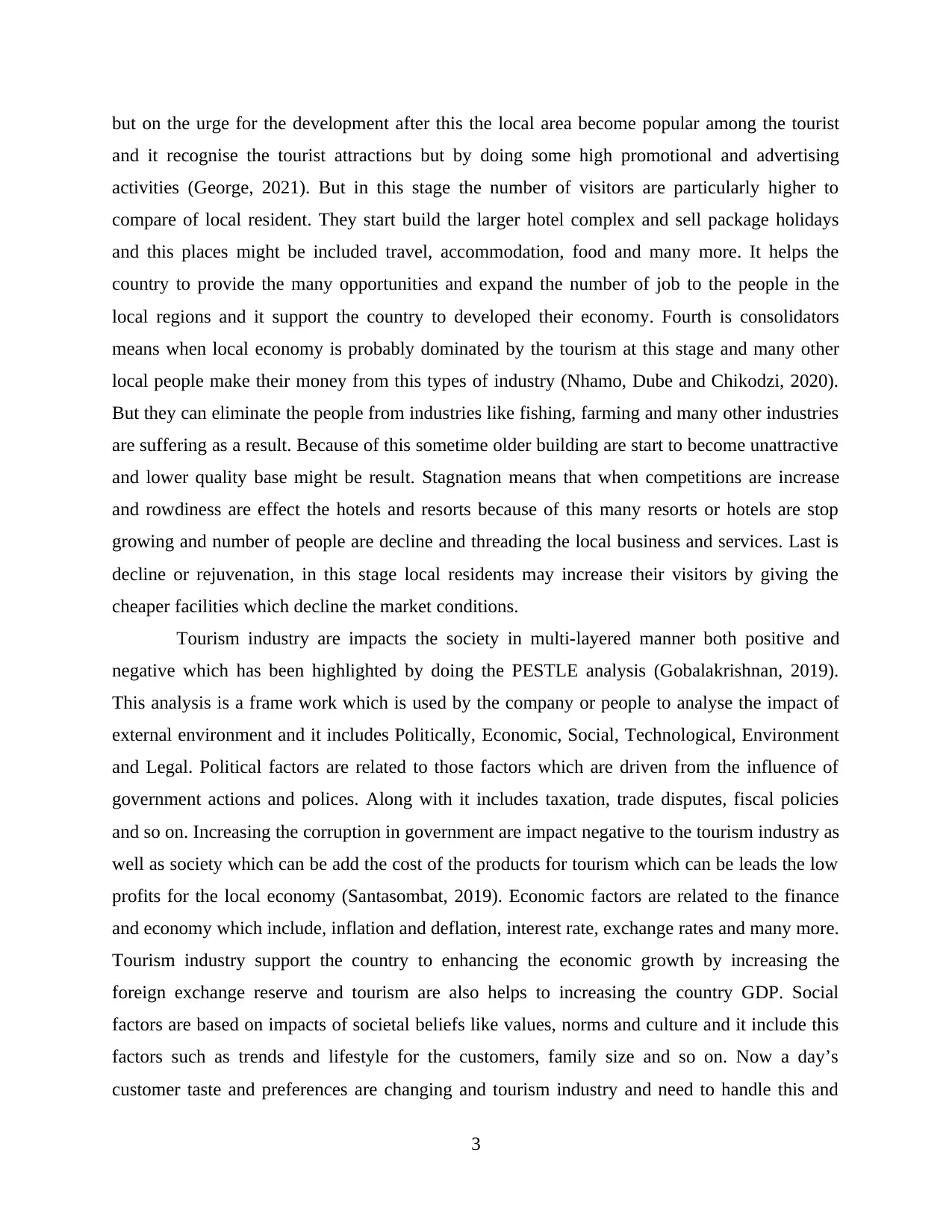
but on the urge for the development after this the local area become popular among the tourist
and it recognise the tourist attractions but by doing some high promotional and advertising
activities (George, 2021). But in this stage the number of visitors are particularly higher to
compare of local resident. They start build the larger hotel complex and sell package holidays
and this places might be included travel, accommodation, food and many more. It helps the
country to provide the many opportunities and expand the number of job to the people in the
local regions and it support the country to developed their economy. Fourth is consolidators
means when local economy is probably dominated by the tourism at this stage and many other
local people make their money from this types of industry (Nhamo, Dube and Chikodzi, 2020).
But they can eliminate the people from industries like fishing, farming and many other industries
are suffering as a result. Because of this sometime older building are start to become unattractive
and lower quality base might be result. Stagnation means that when competitions are increase
and rowdiness are effect the hotels and resorts because of this many resorts or hotels are stop
growing and number of people are decline and threading the local business and services. Last is
decline or rejuvenation, in this stage local residents may increase their visitors by giving the
cheaper facilities which decline the market conditions.
Tourism industry are impacts the society in multi-layered manner both positive and
negative which has been highlighted by doing the PESTLE analysis (Gobalakrishnan, 2019).
This analysis is a frame work which is used by the company or people to analyse the impact of
external environment and it includes Politically, Economic, Social, Technological, Environment
and Legal. Political factors are related to those factors which are driven from the influence of
government actions and polices. Along with it includes taxation, trade disputes, fiscal policies
and so on. Increasing the corruption in government are impact negative to the tourism industry as
well as society which can be add the cost of the products for tourism which can be leads the low
profits for the local economy (Santasombat, 2019). Economic factors are related to the finance
and economy which include, inflation and deflation, interest rate, exchange rates and many more.
Tourism industry support the country to enhancing the economic growth by increasing the
foreign exchange reserve and tourism are also helps to increasing the country GDP. Social
factors are based on impacts of societal beliefs like values, norms and culture and it include this
factors such as trends and lifestyle for the customers, family size and so on. Now a day’s
customer taste and preferences are changing and tourism industry and need to handle this and
3
and it recognise the tourist attractions but by doing some high promotional and advertising
activities (George, 2021). But in this stage the number of visitors are particularly higher to
compare of local resident. They start build the larger hotel complex and sell package holidays
and this places might be included travel, accommodation, food and many more. It helps the
country to provide the many opportunities and expand the number of job to the people in the
local regions and it support the country to developed their economy. Fourth is consolidators
means when local economy is probably dominated by the tourism at this stage and many other
local people make their money from this types of industry (Nhamo, Dube and Chikodzi, 2020).
But they can eliminate the people from industries like fishing, farming and many other industries
are suffering as a result. Because of this sometime older building are start to become unattractive
and lower quality base might be result. Stagnation means that when competitions are increase
and rowdiness are effect the hotels and resorts because of this many resorts or hotels are stop
growing and number of people are decline and threading the local business and services. Last is
decline or rejuvenation, in this stage local residents may increase their visitors by giving the
cheaper facilities which decline the market conditions.
Tourism industry are impacts the society in multi-layered manner both positive and
negative which has been highlighted by doing the PESTLE analysis (Gobalakrishnan, 2019).
This analysis is a frame work which is used by the company or people to analyse the impact of
external environment and it includes Politically, Economic, Social, Technological, Environment
and Legal. Political factors are related to those factors which are driven from the influence of
government actions and polices. Along with it includes taxation, trade disputes, fiscal policies
and so on. Increasing the corruption in government are impact negative to the tourism industry as
well as society which can be add the cost of the products for tourism which can be leads the low
profits for the local economy (Santasombat, 2019). Economic factors are related to the finance
and economy which include, inflation and deflation, interest rate, exchange rates and many more.
Tourism industry support the country to enhancing the economic growth by increasing the
foreign exchange reserve and tourism are also helps to increasing the country GDP. Social
factors are based on impacts of societal beliefs like values, norms and culture and it include this
factors such as trends and lifestyle for the customers, family size and so on. Now a day’s
customer taste and preferences are changing and tourism industry and need to handle this and
3
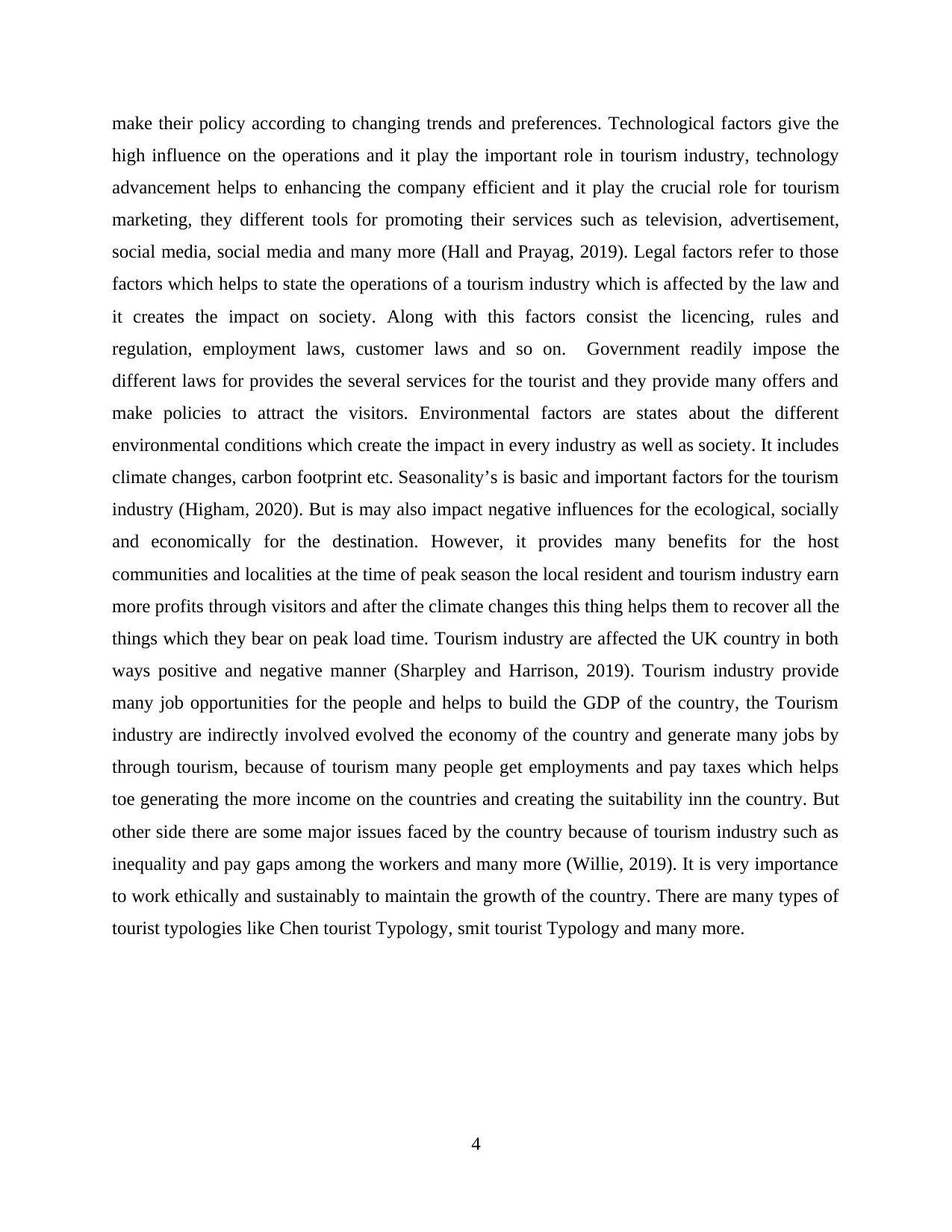
make their policy according to changing trends and preferences. Technological factors give the
high influence on the operations and it play the important role in tourism industry, technology
advancement helps to enhancing the company efficient and it play the crucial role for tourism
marketing, they different tools for promoting their services such as television, advertisement,
social media, social media and many more (Hall and Prayag, 2019). Legal factors refer to those
factors which helps to state the operations of a tourism industry which is affected by the law and
it creates the impact on society. Along with this factors consist the licencing, rules and
regulation, employment laws, customer laws and so on. Government readily impose the
different laws for provides the several services for the tourist and they provide many offers and
make policies to attract the visitors. Environmental factors are states about the different
environmental conditions which create the impact in every industry as well as society. It includes
climate changes, carbon footprint etc. Seasonality’s is basic and important factors for the tourism
industry (Higham, 2020). But is may also impact negative influences for the ecological, socially
and economically for the destination. However, it provides many benefits for the host
communities and localities at the time of peak season the local resident and tourism industry earn
more profits through visitors and after the climate changes this thing helps them to recover all the
things which they bear on peak load time. Tourism industry are affected the UK country in both
ways positive and negative manner (Sharpley and Harrison, 2019). Tourism industry provide
many job opportunities for the people and helps to build the GDP of the country, the Tourism
industry are indirectly involved evolved the economy of the country and generate many jobs by
through tourism, because of tourism many people get employments and pay taxes which helps
toe generating the more income on the countries and creating the suitability inn the country. But
other side there are some major issues faced by the country because of tourism industry such as
inequality and pay gaps among the workers and many more (Willie, 2019). It is very importance
to work ethically and sustainably to maintain the growth of the country. There are many types of
tourist typologies like Chen tourist Typology, smit tourist Typology and many more.
4
high influence on the operations and it play the important role in tourism industry, technology
advancement helps to enhancing the company efficient and it play the crucial role for tourism
marketing, they different tools for promoting their services such as television, advertisement,
social media, social media and many more (Hall and Prayag, 2019). Legal factors refer to those
factors which helps to state the operations of a tourism industry which is affected by the law and
it creates the impact on society. Along with this factors consist the licencing, rules and
regulation, employment laws, customer laws and so on. Government readily impose the
different laws for provides the several services for the tourist and they provide many offers and
make policies to attract the visitors. Environmental factors are states about the different
environmental conditions which create the impact in every industry as well as society. It includes
climate changes, carbon footprint etc. Seasonality’s is basic and important factors for the tourism
industry (Higham, 2020). But is may also impact negative influences for the ecological, socially
and economically for the destination. However, it provides many benefits for the host
communities and localities at the time of peak season the local resident and tourism industry earn
more profits through visitors and after the climate changes this thing helps them to recover all the
things which they bear on peak load time. Tourism industry are affected the UK country in both
ways positive and negative manner (Sharpley and Harrison, 2019). Tourism industry provide
many job opportunities for the people and helps to build the GDP of the country, the Tourism
industry are indirectly involved evolved the economy of the country and generate many jobs by
through tourism, because of tourism many people get employments and pay taxes which helps
toe generating the more income on the countries and creating the suitability inn the country. But
other side there are some major issues faced by the country because of tourism industry such as
inequality and pay gaps among the workers and many more (Willie, 2019). It is very importance
to work ethically and sustainably to maintain the growth of the country. There are many types of
tourist typologies like Chen tourist Typology, smit tourist Typology and many more.
4
⊘ This is a preview!⊘
Do you want full access?
Subscribe today to unlock all pages.

Trusted by 1+ million students worldwide
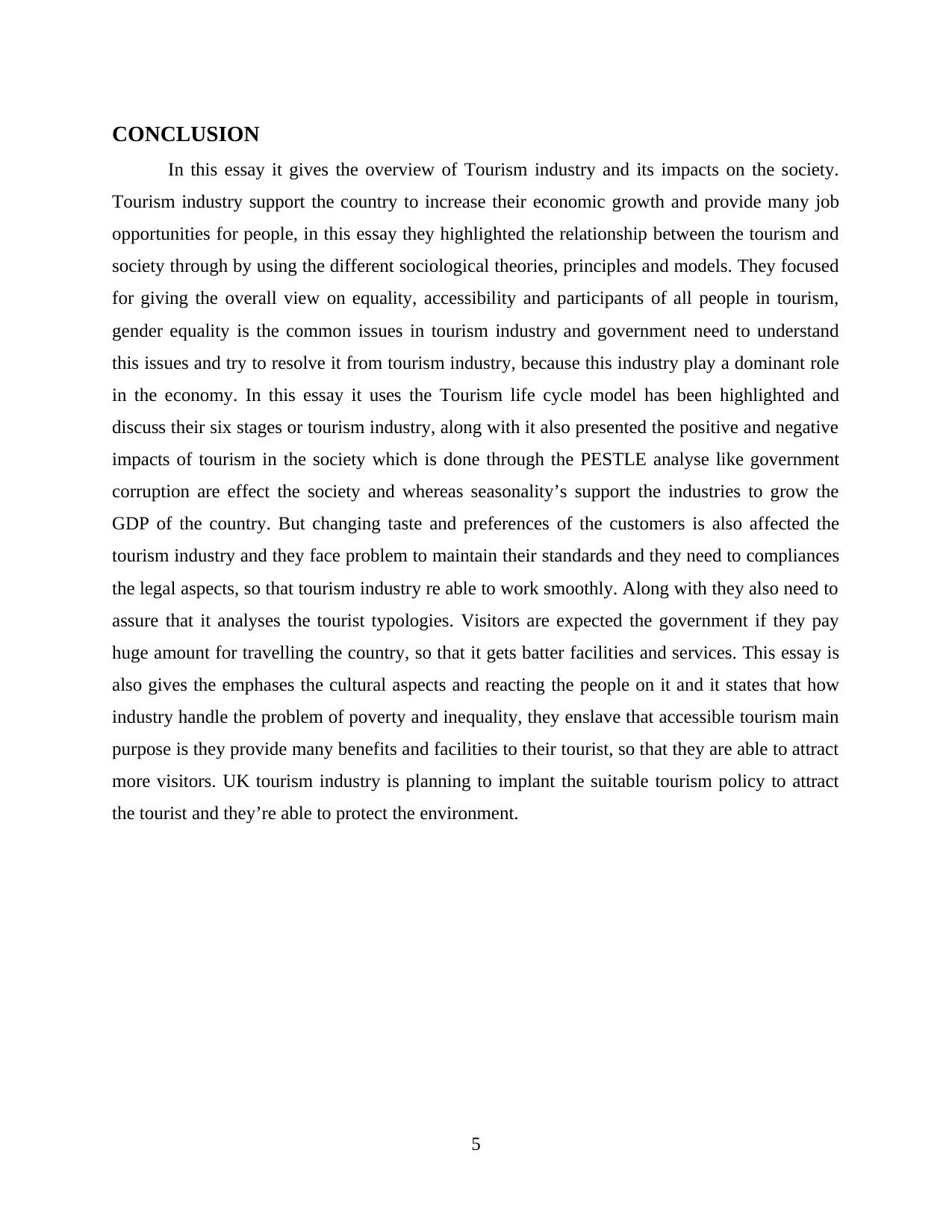
CONCLUSION
In this essay it gives the overview of Tourism industry and its impacts on the society.
Tourism industry support the country to increase their economic growth and provide many job
opportunities for people, in this essay they highlighted the relationship between the tourism and
society through by using the different sociological theories, principles and models. They focused
for giving the overall view on equality, accessibility and participants of all people in tourism,
gender equality is the common issues in tourism industry and government need to understand
this issues and try to resolve it from tourism industry, because this industry play a dominant role
in the economy. In this essay it uses the Tourism life cycle model has been highlighted and
discuss their six stages or tourism industry, along with it also presented the positive and negative
impacts of tourism in the society which is done through the PESTLE analyse like government
corruption are effect the society and whereas seasonality’s support the industries to grow the
GDP of the country. But changing taste and preferences of the customers is also affected the
tourism industry and they face problem to maintain their standards and they need to compliances
the legal aspects, so that tourism industry re able to work smoothly. Along with they also need to
assure that it analyses the tourist typologies. Visitors are expected the government if they pay
huge amount for travelling the country, so that it gets batter facilities and services. This essay is
also gives the emphases the cultural aspects and reacting the people on it and it states that how
industry handle the problem of poverty and inequality, they enslave that accessible tourism main
purpose is they provide many benefits and facilities to their tourist, so that they are able to attract
more visitors. UK tourism industry is planning to implant the suitable tourism policy to attract
the tourist and they’re able to protect the environment.
5
In this essay it gives the overview of Tourism industry and its impacts on the society.
Tourism industry support the country to increase their economic growth and provide many job
opportunities for people, in this essay they highlighted the relationship between the tourism and
society through by using the different sociological theories, principles and models. They focused
for giving the overall view on equality, accessibility and participants of all people in tourism,
gender equality is the common issues in tourism industry and government need to understand
this issues and try to resolve it from tourism industry, because this industry play a dominant role
in the economy. In this essay it uses the Tourism life cycle model has been highlighted and
discuss their six stages or tourism industry, along with it also presented the positive and negative
impacts of tourism in the society which is done through the PESTLE analyse like government
corruption are effect the society and whereas seasonality’s support the industries to grow the
GDP of the country. But changing taste and preferences of the customers is also affected the
tourism industry and they face problem to maintain their standards and they need to compliances
the legal aspects, so that tourism industry re able to work smoothly. Along with they also need to
assure that it analyses the tourist typologies. Visitors are expected the government if they pay
huge amount for travelling the country, so that it gets batter facilities and services. This essay is
also gives the emphases the cultural aspects and reacting the people on it and it states that how
industry handle the problem of poverty and inequality, they enslave that accessible tourism main
purpose is they provide many benefits and facilities to their tourist, so that they are able to attract
more visitors. UK tourism industry is planning to implant the suitable tourism policy to attract
the tourist and they’re able to protect the environment.
5
Paraphrase This Document
Need a fresh take? Get an instant paraphrase of this document with our AI Paraphraser
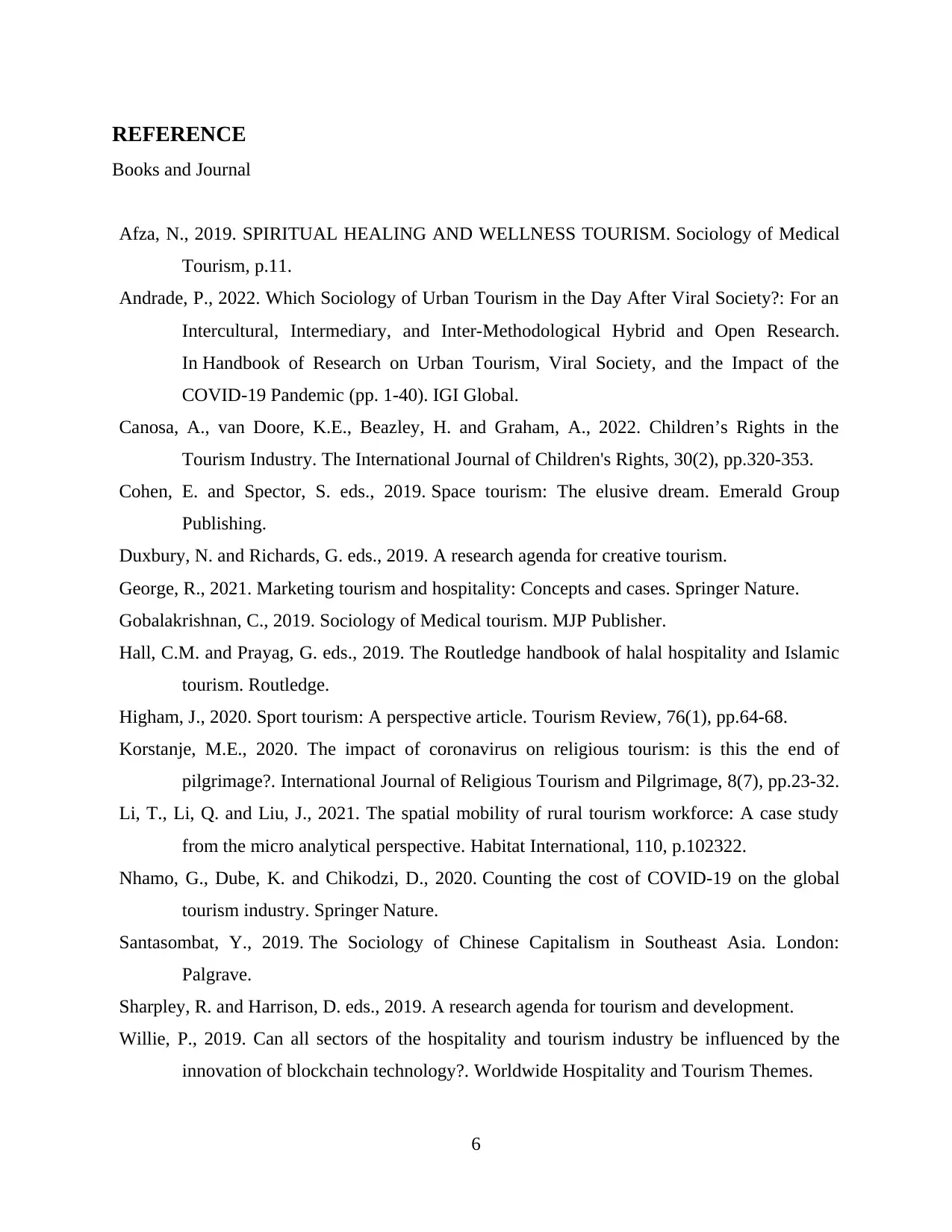
REFERENCE
Books and Journal
Afza, N., 2019. SPIRITUAL HEALING AND WELLNESS TOURISM. Sociology of Medical
Tourism, p.11.
Andrade, P., 2022. Which Sociology of Urban Tourism in the Day After Viral Society?: For an
Intercultural, Intermediary, and Inter-Methodological Hybrid and Open Research.
In Handbook of Research on Urban Tourism, Viral Society, and the Impact of the
COVID-19 Pandemic (pp. 1-40). IGI Global.
Canosa, A., van Doore, K.E., Beazley, H. and Graham, A., 2022. Children’s Rights in the
Tourism Industry. The International Journal of Children's Rights, 30(2), pp.320-353.
Cohen, E. and Spector, S. eds., 2019. Space tourism: The elusive dream. Emerald Group
Publishing.
Duxbury, N. and Richards, G. eds., 2019. A research agenda for creative tourism.
George, R., 2021. Marketing tourism and hospitality: Concepts and cases. Springer Nature.
Gobalakrishnan, C., 2019. Sociology of Medical tourism. MJP Publisher.
Hall, C.M. and Prayag, G. eds., 2019. The Routledge handbook of halal hospitality and Islamic
tourism. Routledge.
Higham, J., 2020. Sport tourism: A perspective article. Tourism Review, 76(1), pp.64-68.
Korstanje, M.E., 2020. The impact of coronavirus on religious tourism: is this the end of
pilgrimage?. International Journal of Religious Tourism and Pilgrimage, 8(7), pp.23-32.
Li, T., Li, Q. and Liu, J., 2021. The spatial mobility of rural tourism workforce: A case study
from the micro analytical perspective. Habitat International, 110, p.102322.
Nhamo, G., Dube, K. and Chikodzi, D., 2020. Counting the cost of COVID-19 on the global
tourism industry. Springer Nature.
Santasombat, Y., 2019. The Sociology of Chinese Capitalism in Southeast Asia. London:
Palgrave.
Sharpley, R. and Harrison, D. eds., 2019. A research agenda for tourism and development.
Willie, P., 2019. Can all sectors of the hospitality and tourism industry be influenced by the
innovation of blockchain technology?. Worldwide Hospitality and Tourism Themes.
6
Books and Journal
Afza, N., 2019. SPIRITUAL HEALING AND WELLNESS TOURISM. Sociology of Medical
Tourism, p.11.
Andrade, P., 2022. Which Sociology of Urban Tourism in the Day After Viral Society?: For an
Intercultural, Intermediary, and Inter-Methodological Hybrid and Open Research.
In Handbook of Research on Urban Tourism, Viral Society, and the Impact of the
COVID-19 Pandemic (pp. 1-40). IGI Global.
Canosa, A., van Doore, K.E., Beazley, H. and Graham, A., 2022. Children’s Rights in the
Tourism Industry. The International Journal of Children's Rights, 30(2), pp.320-353.
Cohen, E. and Spector, S. eds., 2019. Space tourism: The elusive dream. Emerald Group
Publishing.
Duxbury, N. and Richards, G. eds., 2019. A research agenda for creative tourism.
George, R., 2021. Marketing tourism and hospitality: Concepts and cases. Springer Nature.
Gobalakrishnan, C., 2019. Sociology of Medical tourism. MJP Publisher.
Hall, C.M. and Prayag, G. eds., 2019. The Routledge handbook of halal hospitality and Islamic
tourism. Routledge.
Higham, J., 2020. Sport tourism: A perspective article. Tourism Review, 76(1), pp.64-68.
Korstanje, M.E., 2020. The impact of coronavirus on religious tourism: is this the end of
pilgrimage?. International Journal of Religious Tourism and Pilgrimage, 8(7), pp.23-32.
Li, T., Li, Q. and Liu, J., 2021. The spatial mobility of rural tourism workforce: A case study
from the micro analytical perspective. Habitat International, 110, p.102322.
Nhamo, G., Dube, K. and Chikodzi, D., 2020. Counting the cost of COVID-19 on the global
tourism industry. Springer Nature.
Santasombat, Y., 2019. The Sociology of Chinese Capitalism in Southeast Asia. London:
Palgrave.
Sharpley, R. and Harrison, D. eds., 2019. A research agenda for tourism and development.
Willie, P., 2019. Can all sectors of the hospitality and tourism industry be influenced by the
innovation of blockchain technology?. Worldwide Hospitality and Tourism Themes.
6
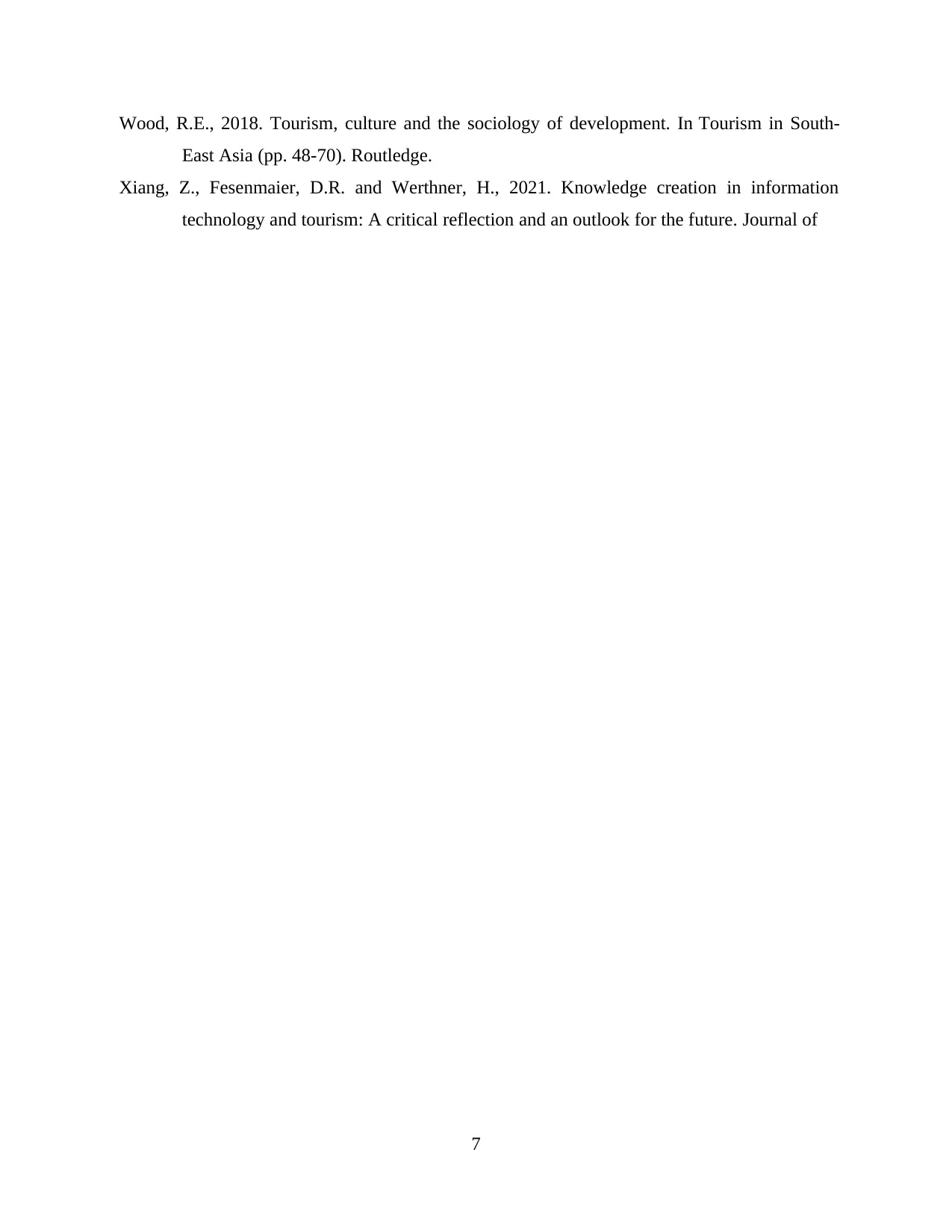
Wood, R.E., 2018. Tourism, culture and the sociology of development. In Tourism in South-
East Asia (pp. 48-70). Routledge.
Xiang, Z., Fesenmaier, D.R. and Werthner, H., 2021. Knowledge creation in information
technology and tourism: A critical reflection and an outlook for the future. Journal of
7
East Asia (pp. 48-70). Routledge.
Xiang, Z., Fesenmaier, D.R. and Werthner, H., 2021. Knowledge creation in information
technology and tourism: A critical reflection and an outlook for the future. Journal of
7
⊘ This is a preview!⊘
Do you want full access?
Subscribe today to unlock all pages.

Trusted by 1+ million students worldwide
1 out of 9
Related Documents
Your All-in-One AI-Powered Toolkit for Academic Success.
+13062052269
info@desklib.com
Available 24*7 on WhatsApp / Email
![[object Object]](/_next/static/media/star-bottom.7253800d.svg)
Unlock your academic potential
Copyright © 2020–2025 A2Z Services. All Rights Reserved. Developed and managed by ZUCOL.




